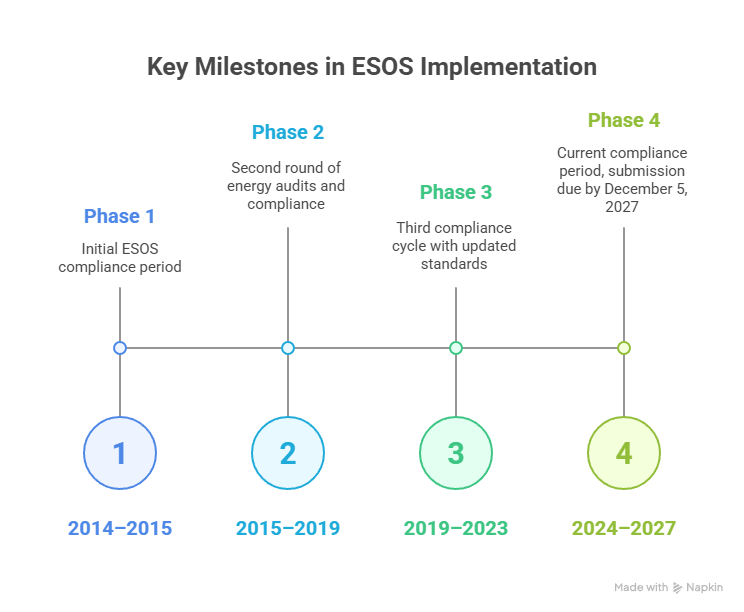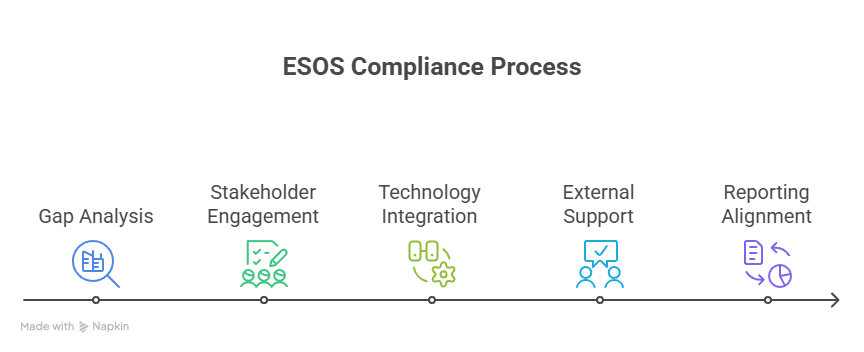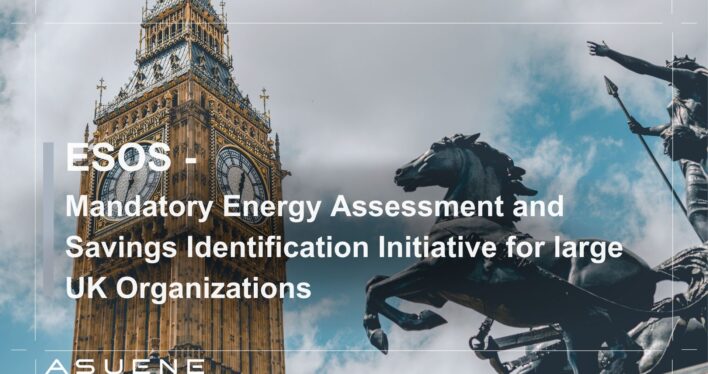- Article Summary
-
Overview
The Energy Savings Opportunity Scheme (ESOS) is a mandatory energy assessment and savings identification initiative for large UK organizations. As it enters Phase 4 (2024–2027), the scope and obligations are evolving significantly in line with the UK’s Net Zero Strategy. For U.S.-based corporations with operations in the UK, understanding and aligning with ESOS Phase 4 is not just a compliance matter—it is a strategic imperative.
The UK government has positioned ESOS as a driver of operational efficiency, cost savings, and decarbonization. With new requirements to disclose energy efficiency measures and stricter enforcement mechanisms, Phase 4 signals a move from passive reporting to active implementation.
Understanding ESOS and Its Evolution
Established under the EU Energy Efficiency Directive and retained post-Brexit, ESOS requires qualifying UK organizations to conduct energy audits every four years. These audits identify cost-effective energy savings opportunities across buildings, transport, and industrial operations.

Key milestones:
- Phase 1: 2014–2015
- Phase 2: 2015–2019
- Phase 3: 2019–2023
- Phase 4: 2024–2027 (submission due by December 5, 2027)
In Phase 4, organizations must go beyond identification. The scheme now mandates action plans, board-level sign-off, and improved data quality. The Department for Energy Security and Net Zero (DESNZ) has also aligned ESOS with Streamlined Energy and Carbon Reporting (SECR) for greater transparency.

New Requirements in Phase 4
Phase 4 introduces a range of enhancements designed to drive real-world energy performance improvement:
Major changes include:
- Mandatory reporting of energy saving actions taken
- Integration with SECR to consolidate reporting efforts
- Standardization of audit methodologies
- Requirement to share summaries with employees
- Introduction of energy intensity metrics (e.g., kWh per unit of output)
The shift reflects the UK’s broader ambitions under the Net Zero Strategy and the Industrial Decarbonisation agenda. Organizations must now demonstrate not just awareness but execution of energy-saving measures.
Relevance for U.S. Multinationals
Many U.S.-headquartered companies have UK subsidiaries or facilities and thus fall under ESOS requirements if they meet certain thresholds:
- Employs 250+ people OR
- Has annual turnover > £44 million and balance sheet > £38 million
Compliance risks include financial penalties, reputational damage, and strained regulator relations. More importantly, proactive alignment with ESOS can unlock competitive advantages:
- Identify cost-saving efficiency measures
- Strengthen ESG reporting credentials
- Harmonize global energy management systems (e.g., ISO 50001)
- Improve internal accountability and stakeholder engagement
Implementation Roadmap

Preparing for Phase 4 requires a structured, cross-functional approach. Best practices include:
- Gap Analysis: Review current audit scope, systems, and compliance status.
- Stakeholder Engagement: Assign responsibility across operations, finance, and sustainability teams.
- Technology Integration: Leverage IoT, smart meters, and analytics for real-time data.
- External Support: Work with ESOS Lead Assessors and accredited consultants.
- Reporting Alignment: Streamline SECR and ESOS documentation for efficiency.
By embedding ESOS into strategic planning, organizations can avoid last-minute compliance scrambles and drive long-term value.
Conclusion
ESOS Phase 4 is a decisive shift from audits-as-formality to audits-as-action. For U.S. companies operating in the UK, this represents both a compliance obligation and a strategic opportunity to enhance energy performance, improve cost structures, and elevate ESG standing. With stricter reporting rules and rising stakeholder expectations, the time to prepare is now.
Organizations that treat ESOS Phase 4 as part of their broader decarbonization journey will not only meet regulatory demands but also gain a competitive edge in the low-carbon economy.
Why Work with ASUENE Inc.?
Asuene is a key player in carbon accounting, offering a comprehensive platform that measures, reduces, and reports emissions, including Scope 1-3, with expertise in decarbonization. Asuene serves over 10,000 clients worldwide, providing an all-in-one solution that integrates GHG accounting, ESG supply chain management, a Carbon Credit exchange platform, and third-party verification.
ASUENE supports companies in achieving net-zero goals through advanced technology, consulting services, and an extensive network.


